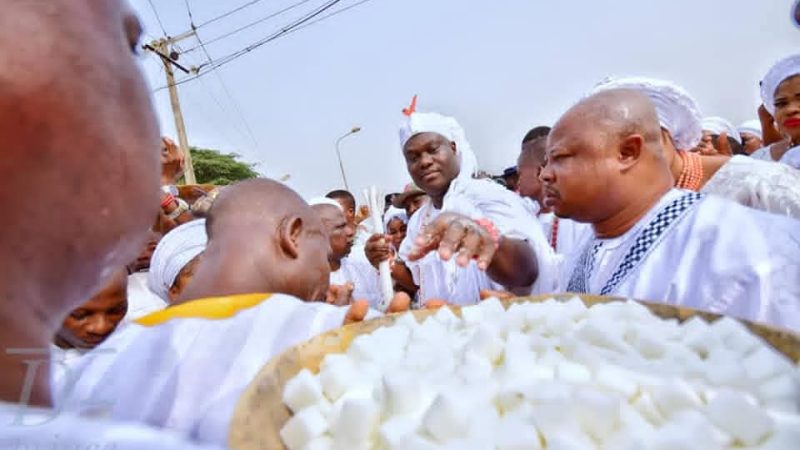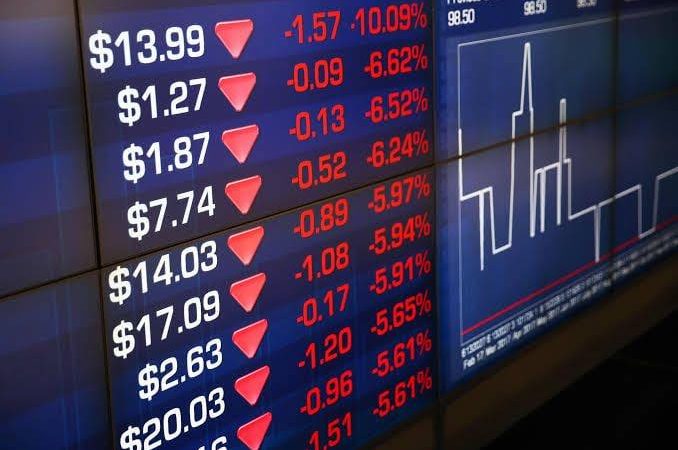From a historic power shift to the echoes of identity politics, navigating the complex intersections of governance, power, and identity became a defining feature of Nigeria’s social and political fabric in 2023.
Here are six political key events that shaped Nigeria in 2023, which may also have an impact on the nation’s future:
1. The 2023 Presidential Election
The 2023 presidential election, fiercely contested by 18 candidates, remained a defining moment for Nigeria in 2023.
The election was won by Bola Tinubu of the All Progressives Congress, marking a shift in political tides as the opposition reiterated allegations of rigging until the matter was settled by the Supreme Court.
The former Lagos State Governor, according to INEC secured a total of 8,794,726 votes, representing 37 per cent of total votes cast to beat Atiku Abubakar of the Peoples Democratic Party who got 6,984,520 votes or 29 per cent of votes cast, and Peter Obi of the Labour Party who garnered 6,101,533 or 25 percent of votes cast, to second and third places respectively.
While the election ushered in a fresh start, the undercurrent of identity politics continued to reverberate throughout 2023.
This was buttressed in the sentiments of marginalization, especially amongst Nigerians of South-East extraction — this led to the surprising ascent of Peter Obi, who stood as a strong Third Force against the established duo of the All Progressives Congress and the Peoples Democratic Party.
From debates on ethnic and religious representation in government to regional concerns about resource allocation, the ‘us’ versus ‘them’ narrative often took center stage.
The challenge now lies in weaving these diverse threads into a unified tapestry, fostering a sense of national unity that transcends individual identities.
2. Judicial Decisions with Far-Reaching Impact
The judiciary played a pivotal role in 2023, delivering landmark rulings on issues ranging from electoral disputes to constitutional amendments.
Nigeria’s Supreme Court, in October, upheld the election of President Bola Ahmed Tinubu, ending months of legal battles over the presidential race.
The seven-member court ruled against the opposition’s challenges of fraud and electoral law breaches during the election.
These pronouncements, resonating across the country, had profound implications for the future of democracy and the rule of law in the country.
As Nigerians grapple with the implications of these decisions, they offer valuable insights into the evolving legal framework and its impact on the nation’s governance.
3. Wike-Fubara Feud
Just seven months after Nyesome Wike secured the governorship for his godson, Siminalayi Fubara, Rivers State is witnessing a political earthquake. Cracks are appearing in the once-monolithic Wike dynasty, as Fubara asserts his independence, leaving the former governor and now Minister of the FCT grappling with fading control.
Fubara, having taken the oath of office, seems determined to carve his own path. News sources paint a picture of a governor eager to implement his own vision for improving lives, independent of Wike’s influence. This sits poorly with the Minister, who reportedly bankrolled Fubara’s campaign and expected unyielding loyalty.
Analysts offer several perspectives on this unfolding drama. Some view it as a natural evolution, where an ambitious protégé eventually breaks free from a powerful patron. Others see it as a power struggle, with Wike unwilling to relinquish control and Fubara determined to govern on his own terms.
The consequences for Rivers State remain uncertain. Will Fubara’s vision for the state flourish independent of Wike’s influence? Can the political turmoil be stabilized, or will it further cripple governance? Only time will tell how this power play unfolds, but one thing is clear: the Wike era in Rivers State appears to be entering a new, uncharted chapter.
4. Adamawa 2023: A Tale of Intrigues and Controversy
The March 18 governorship election in Adamawa state stands as a dramatic and controversial chapter in Nigeria’s 2023 electoral saga. Incumbent Governor Ahmadu Fintiri, running for the PDP, appeared firmly on course for re-election. After collating results from 10 of the state’s 21 Local Government Areas (LGAs), he held a comfortable lead of 31,249 votes over his main rival, Aisha ‘Binani’ Dahiru of the APC.
In a dramatic unprecedented twist, the state‘s Resident Electoral Commissioner, Yunusa Hudu Ari, in the early hours of Sunday after the polls, sneaked into the state governorship collation centre to declare Senator Dahiru Ahmed of the APC as winner of the governorship poll.
Meanwhile, INEC in a tweet on its official Twitter handle asked Nigerians to disregard the action of the Adamawa REC, who it accused of usurping the powers of the Returning Officer, Professor Mohammed Mele, and proceeded in announcing the results of the polls that had yet to be tallied and concluded.
Fintiri and the PDP swiftly rejected the results, alleging discrepancies and manipulation, particularly in the supplementary polls. They pointed to the dramatic turn in fortune after Fintiri’s initial lead and questioned the rationale behind the supplementary polls in certain areas. This triggered legal challenges, petitions, and a heated public debate over the legitimacy of the outcome.
The controversy surrounding the Adamawa election raises several critical questions. Did irregularities compromise the integrity of the polls? Was the decision to hold supplementary elections in specific areas influenced by partisan leanings? And did the REC’s declaration of Binani’s victory before all results were fully collated follow due process?
Eventually, the Court of Appeal in Abuja affirmed Ahmadu Fintiri of the People’s Democratic Party (PDP) as Governor of Adamawa State after dismissing the appeal of Aishatu Binani of the All Progressives Congress (APC) for lacking merit.
5. Obaseki and Shaibu’s Political Bond Hits a Wall
The once-unbreakable bond between Edo State’s Governor Godwin Obaseki and his deputy, Philip Shaibu, appears to be shattering. For years, their political partnership thrived, weathering storms and securing a resounding victory for the PDP in the 2020 gubernatorial election. However, as the 2024 polls loom, ambition and differing visions have driven a wedge between the two, raising questions about their future and the stability of Edo politics.
Obaseki’s desire for a “power shift” to Edo Central, the zone that hasn’t produced a governor since 1999, stands in stark contrast to Shaibu’s own aspirations. The deputy governor, hailing from Edo North, argues that his zone has been unfairly sidelined by the PDP, despite its loyalty and contributions to the party’s success. This clash of ambitions has fueled the flames of discontent, transforming a once-fruitful partnership into a simmering rivalry.
The fallout is not merely personal. It has the potential to reshape the political landscape of Edo State. Shaibu’s clout, particularly in his home zone, could pose a significant challenge to Obaseki’s preferred candidate. Additionally, the internal divisions within the PDP could provide an opening for the opposition APC, waiting to capitalize on any fissures in the ruling party.
The Obaseki-Shaibu rift presents a complex and intriguing political puzzle. Can the two mend their fractured relationship, or will their personal ambitions tear the PDP apart? Will Edo Central finally see its turn to lead, or will Edo North claim its rightful share of power? Only time will tell how this political soap opera unfolds, but one thing is certain: the stakes are high, and the consequences for Edo State’s political future are significant.
Ondo’s Power Play
Ondo State has witnessed a dramatic political shift, with Lucky Aiyedatiwa first assuming the role of acting governor in the wake of Governor Rotimi Akeredolu’s prolonged medical treatment abroad.
This development, brokered by President Tinubu, marks a significant turn in the state’s political landscape, raising questions about governance, succession, and the influence of external actors.
Akeredolu, initially seeking treatment in Germany during June, returned in September. However, his recent departure for a follow-up visit, coupled with the extended duration of his absence, sparked concerns about the continuity of governance and the potential for political instability.
These concerns were further amplified by the lack of a clear transition plan or designated acting governor.
President Tinubu’s intervention, leading to Aiyedatiwa’s appointment, injected a sense of stability into the situation. This move drew mixed reactions. Some lauded it as a pragmatic solution to address the immediate need for leadership, while others questioned the rationale behind Tinubu’s involvement and its potential implications for Ondo’s political autonomy.
The sad news of the passing of Akeredolu was announced. He had succumbed to his illness and died in the hospital. Many argued that he may have survived had he simply left the issues of power for that time being and taken care of his health. But now we’ll never know!
As the dust settles on 2023, the question remains: what does the new year hold for Nigeria’s future? The echoes of these events will undoubtedly reverberate in the years to come, shaping the nation’s political landscape, social dynamics, and economic trajectory.




